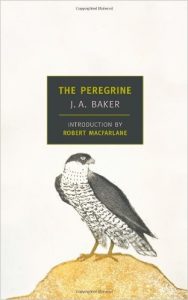
Guest contributor: Bill Lundgren
Lundgren’s Lounge: “The Peregrine,” by J.A. Baker
categories: Cocktail Hour / Getting Outside / Guest Columns / Reading Under the Influence
Comments Off on Lundgren’s Lounge: “The Peregrine,” by J.A. Baker

Somehow this once obscure, extraordinarily unique book found its way into my hands, transporting me for a few days to the coastal fenlands of eastern England and the world of the peregrine falcon. The Peregrine by J. A. Baker was originally published in 1967 during a period of steep decline in the population of these magnificent raptors and perhaps that was part of what motivated the author—to attempt to describe the life of a creature at once so ferociously singular and powerful, before it was gone forever. But what Baker accomplishes along the way is much deeper, achieving “… an account of a human obsession with a creature that is peerless.”
 Werner Herzog suggests that The Peregrine is “… the one book I would ask you to read if you want to make films…” and Naturalist Barry Lopez has written that the book is “… one of the most beautifully written, carefully observed and evocative wildlife accounts I have ever read.” But none of these observations can adequately describe the sweeping impact of Baker’s language: what he has accomplished in this slim tome is granting the reader the power and permission to momentarily slip the strictures of our human consciousness and enter the soaring, magisterial world of the falcon. One commentator observed that “… again and again, (Baker) astonishes us at the level of the sentence,” while others have alluded to Baker’s “becoming” the falcon in a process likened to transubstantiation.
Werner Herzog suggests that The Peregrine is “… the one book I would ask you to read if you want to make films…” and Naturalist Barry Lopez has written that the book is “… one of the most beautifully written, carefully observed and evocative wildlife accounts I have ever read.” But none of these observations can adequately describe the sweeping impact of Baker’s language: what he has accomplished in this slim tome is granting the reader the power and permission to momentarily slip the strictures of our human consciousness and enter the soaring, magisterial world of the falcon. One commentator observed that “… again and again, (Baker) astonishes us at the level of the sentence,” while others have alluded to Baker’s “becoming” the falcon in a process likened to transubstantiation.
Throughout Baker’s account we are offered little of the author’s personal life. His methodology is simple: to follow a pair of falcons around the marshes and estuaries of eastern coastal England, sometimes on foot, sometimes on bicycle, assiduously avoiding all contact with other humans. We get the sense that sometimes days might pass with little contact with his subjects, but those periods of isolation and loneliness are forgotten in the intense experience of contact. In the aftermath of one breathtaking account of a partridge kill, Baker writes: “… for the hawk, resting now on the soft, flaccid bulk of his prey, there was the rip and tear of choking feathers, and hot blood dripping from the hook of the beak, and rage dying slowly to a small hard core within. And for the watcher, sheltered for centuries from such hunger and such rage, such agony and such fear, there is the memory of that sabring fall from the sky and the vicarious joy of the guiltless hunter…”
Writing this description I am suddenly aware of the inadequacy of conveying the power of The Peregrine by writing about it: it must be read and experienced through the eyes of the author and more significantly, the intense, unrelenting gaze of his subjects.
 Bill Lundgren is a writer, teacher, critic, and bookseller living in Portland, Maine.
Bill Lundgren is a writer, teacher, critic, and bookseller living in Portland, Maine.
